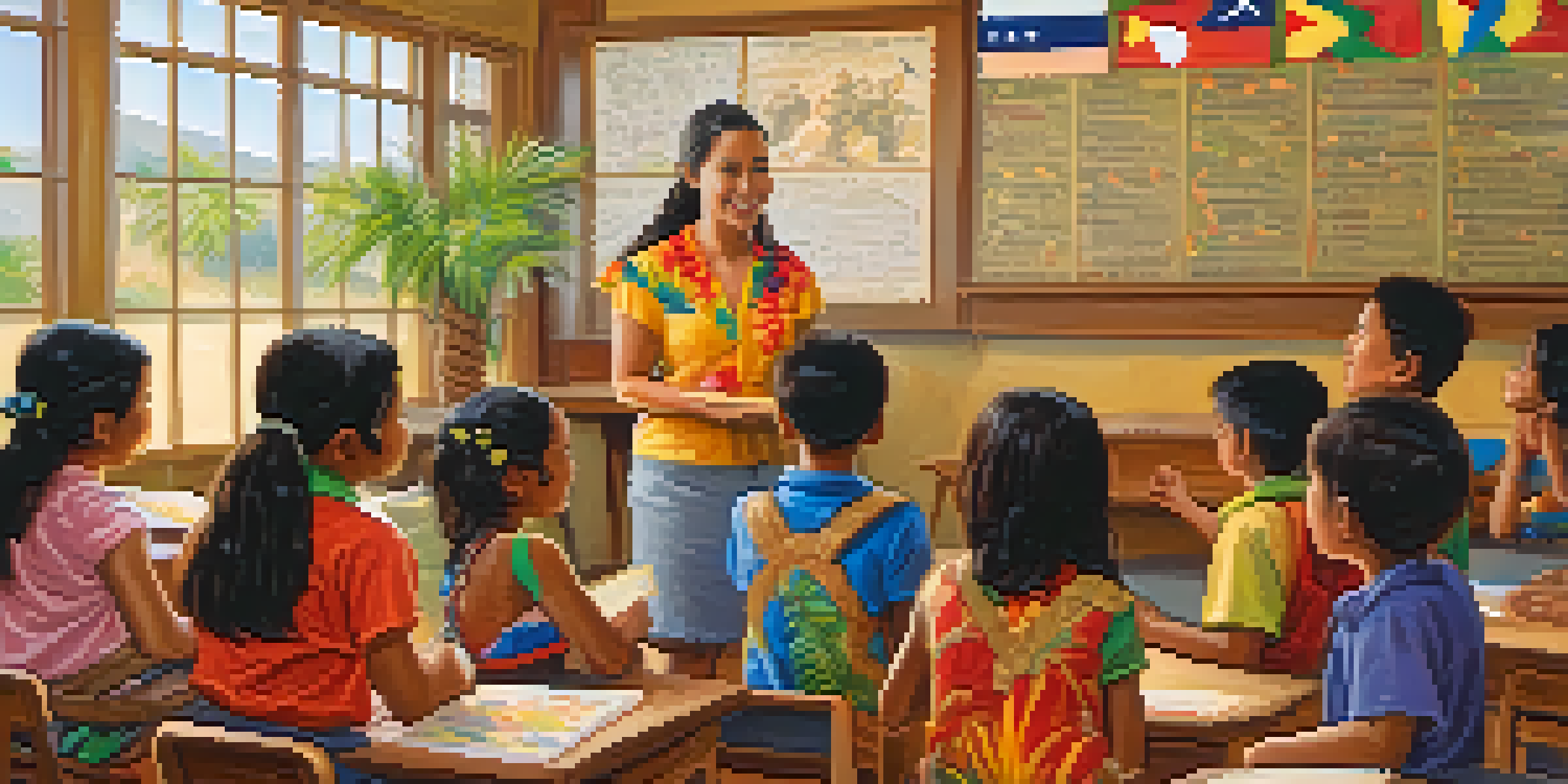The Role of Hawaiian Culture in Education Policies

The Importance of Hawaiian Culture in Education
Hawaiian culture is rich with traditions, values, and practices that have shaped the identity of the islands. Integrating this culture into education fosters a sense of belonging among students, making learning more relevant to their lives. By recognizing the significance of cultural heritage, educators can create a more inclusive environment that honors diverse backgrounds.
Education is the most powerful weapon which you can use to change the world.
Moreover, incorporating Hawaiian cultural practices can enhance students' engagement and motivation. For example, using traditional stories or songs in the curriculum can provide meaningful connections to the material being taught. This approach not only enriches the educational experience but also helps preserve the cultural heritage for future generations.
Ultimately, recognizing the importance of Hawaiian culture in education allows for a holistic approach to learning. It bridges the gap between academic content and cultural relevance, ensuring that students not only excel academically but also develop a strong sense of identity and pride in their heritage.
Historical Context of Education Policies in Hawaii
Education policies in Hawaii have evolved significantly over the years, often reflecting the broader socio-political landscape. Historically, the imposition of Western educational models marginalized indigenous knowledge and practices. This shift led to a cultural disconnect for many Hawaiian students, who found themselves navigating a system that didn’t acknowledge their roots.

In response to this disconnection, there has been a growing movement to integrate Hawaiian cultural values into educational frameworks. Legislation such as the Hawaiian Studies Initiative has emerged, emphasizing the need for curriculum that reflects local history and culture. These policies aim not only to educate but to empower students by validating their backgrounds.
Cultural Integration Enhances Learning
Incorporating Hawaiian culture into education fosters engagement and relevance, creating a sense of belonging for students.
The historical context of these education policies highlights the ongoing struggle for cultural recognition within the academic sphere. Acknowledging this history is vital as it informs current practices and the continuous effort to create a more equitable educational landscape.
Current Education Policies Emphasizing Hawaiian Culture
Today, we see a range of education policies explicitly designed to incorporate Hawaiian culture into the classroom. Programs promoting Hawaiian language immersion are gaining popularity, allowing students to learn in their native tongue. This policy not only helps preserve the language but also fosters a deeper connection to Hawaiian identity.
Culture is the widening of the mind and of the spirit.
Furthermore, many schools are adopting culturally relevant curricula that include Hawaiian history, literature, and environmental practices. These policies aim to create a learning environment where students can see themselves reflected in their education. This representation is crucial for building self-esteem and a sense of belonging among Hawaiian youth.
As these policies continue to evolve, they play a significant role in shaping the educational landscape in Hawaii. By prioritizing cultural integration, educators can create a more responsive system that supports the diverse needs of all students.
Challenges in Implementing Cultural Policies
Despite the positive strides in integrating Hawaiian culture into education, challenges remain. One major hurdle is the lack of resources and training for educators to effectively teach Hawaiian cultural content. Many teachers may feel ill-equipped to engage with these subjects, leading to a superficial implementation rather than a deep understanding.
Additionally, there can be resistance from various stakeholders, including parents and community members who may not see the value in these changes. This resistance often stems from a misunderstanding of how culturally relevant education can benefit all students, not just those of Hawaiian descent. Engaging with the community to clarify these benefits is essential.
Community Involvement is Key
Active participation from local organizations and families enriches cultural education and supports student success.
Ultimately, addressing these challenges requires a concerted effort from policymakers, educators, and the community. By working together, they can ensure that Hawaiian culture is not only recognized but celebrated within educational systems.
Success Stories from Hawaiian Schools
There are many inspiring success stories from Hawaiian schools that have embraced cultural education. For instance, schools that have implemented Hawaiian language programs often report higher student engagement and attendance. Students take pride in their heritage, and this pride translates into a more positive educational experience.
Another notable example is the integration of traditional Hawaiian practices, such as mālama ʻāina (caring for the land), into science curriculums. This hands-on approach not only teaches environmental stewardship but also connects students to their ancestors' wisdom and practices. Such initiatives highlight the power of culturally relevant education to foster meaningful learning experiences.
These success stories serve as a testament to the potential of culturally inclusive policies. They showcase how education can be a tool for empowerment and cultural preservation, ultimately benefiting students and the wider community.
The Role of Community in Cultural Education
Community involvement is integral to the success of cultural education in Hawaiian schools. Local organizations, family members, and cultural practitioners can provide invaluable resources and knowledge that enrich the learning experience. Their participation ensures that the curriculum remains relevant and reflective of the community's values.
Moreover, engaging the community fosters a sense of shared responsibility in the educational process. When families are involved, students feel supported both at school and at home, which enhances their overall academic performance. This collaboration creates a strong network that reinforces cultural identity and pride.
Ongoing Challenges Remain
Despite progress, challenges such as resource limitations and community resistance hinder the effective implementation of cultural policies.
Ultimately, the partnership between schools and the community is essential for sustaining Hawaiian culture in education. By working together, they can create a robust educational framework that honors tradition while preparing students for the future.
Future Directions for Hawaiian Education Policies
Looking ahead, the future of Hawaiian education policies seems promising, with a growing recognition of the importance of cultural integration. Educators and policymakers are increasingly advocating for more comprehensive programs that celebrate Hawaiian heritage. This shift indicates a commitment to creating a more inclusive and equitable educational landscape.
Additionally, there is potential for expanding partnerships with local organizations and cultural practitioners. These collaborations can enhance educational resources and provide students with authentic experiences that deepen their understanding of their heritage. As schools adapt to these changes, they can create a more dynamic and engaging learning environment.

In conclusion, the future of education in Hawaii hinges on the ongoing integration of cultural practices and values. By prioritizing Hawaiian culture, education can become a powerful tool for nurturing identity, pride, and academic success among students.